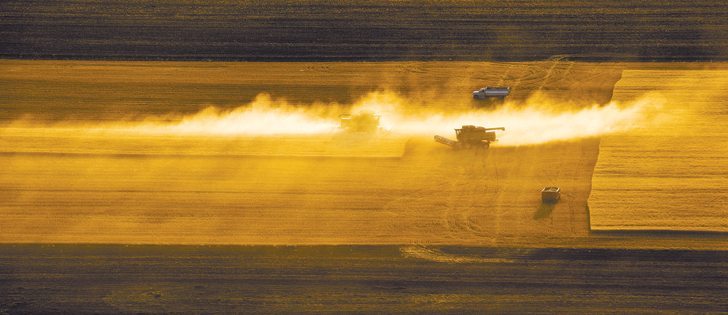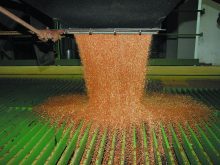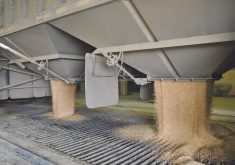Broadacre Agriculture’s creditors will get paid and the company’s shareholders will walk away with some assets, says the company’s chief executive officer.
“We have $14 million worth of crop that we’re marketing now and we own a bunch of land, so we have equity,” said Gary Pike, who is one of the firm’s founders.
The Court of Queen’s Bench of Alberta has given Broadacre until Dec. 4 to develop a plan for how it will appease a long list of creditors owed $46 million.
Read Also

Alberta researcher helps unlock the economics of farming
Lethbridge Polytechnic researcher helping agriculture producers with decision-making tools in economic feasibility
More than half of that amount is owed to three creditors: Farm Credit Canada with $14.8 million in loans, Wigmore Crop Production at $5.17 million and De Lage Landen Financial Services Canada at $5 million.
Jeff Wigmore, president of Wigmore Crop Production, said he has no answers about the demise of Broadacre.
“We were a really good retailer for them. They’ve been a good customer and now we’re here,” he said.
“Broadacre will hopefully be fair to its creditors, and they have good assets. We’re looking forward to finding out the next chapter.”
The court order allows Broadacre to continue normal business operations, temporarily stays all legal proceedings against the company and prevents payment of any amounts owing for goods and services re-ceived before the Nov. 4 filing date.
The court has appointed PricewaterhouseCoopers to monitor the company’s business activities.
“The decision to file for protection was not an easy one,” Broadacre chief financial officer Andrew Marshall said in a letter to creditors.
“We filed for (Companies’ Creditors Arrangement Act) protection to allow for breathing room while we assess the best course of action for the business in the future.”
Broadacre was incorporated in 2010 as a company that was going to buy large tracts of land and exploit the economies of scale associated with running a massive farming operation.
The company made a big splash with the 2012 purchase of Wigmore Farms and its 40,000 acres of leased and owned farmland in southern Saskatchewan.
Pike said the business failed because it lacked access to the capital required to meet its growth objectives.
The goal was to farm more than 200,000 acres. Instead, it had 9,000 acres of owned and 56,000 acres of leased land in Saskatchewan.
Mother Nature wasn’t accommodating, either. Crop production was constrained by multiple floods and a severe outbreak of aster yellows disease, which decimated canola yields in 2012.
Low elevator prices caused by an inability to move the 2013-14 crop also hurt profits.
Pike said Broadacre is a young company with a lot of leased land that was unable to withstand those challenges.
However, a disgruntled former employee believes the company’s problems stemmed from bad management rather than poor weather and other circumstances.
“To go on record and say we haven’t produced and had all this bad luck is complete hogwash,” said Allen Blain, who managed Broadacre’s farm at Gravelbourg until he was asked to resign last May.
He said farmers across Western Canada produced bumper crops in 2012 while Broadacre struggled.
Blain said problems included questionable crop choices, decisions made on available resources rather than sound agronomic practices, a lack of soil testing and excess spoilage in stored grain.
“It was an absolute mess based on management,” he said.
Blain said the farm he ran produced two bumper crops despite being handcuffed by fertilizer shortages, but other operations couldn’t cover their expenses.
A court document filed by Marshall paints a grim picture of the firm’s finances.
“The financial prospects of the company are bleak. It was already in a precarious position at the beginning of 2014 and it has continued in a downward spiral,” he said in an affidavit.
Marshall said the troubles began with the first harvest in 2011, which did not generate a profit.
Poor weather conditions and a disease outbreak the following year slashed canola revenues to $24 million from an anticipated $40 million, forcing the company to ask shareholders for financial support to continue operations in 2013.
It secured a $5.1 million loan from shareholder Kevin Ulrich at an interest rate of 10 percent per year.
The company posted a net loss of $12.2 million for the fiscal year ended March 31, 2013, and another loss of $9.2 million the following year.
Broadacre secured a US$1 million loan from Alan Boyce at 20 percent per year this past summer and $2.6 million from shareholders and other individuals, referred to in the court documents as “related parties,” at 20 percent per year in the fall.
The red ink continues. The company posted a loss of $10.7 million for the first quarter of the current fiscal year and another seven million for the second quarter ending Sept. 30.
This year’s harvest is expected to generate revenues of $14 million, which is lower than the previous two years because of extreme weather in June that caused a one-third reduction in total production.
The company managed to remain current on its equipment and farmland lease obligations, but on June 1 it was unable to make a payment on a $1.9 million crop input loan from the Bank of Nova Scotia.
The bank sent a letter saying it was going to realize on its security and launched a lawsuit seeking payment on its loan. That is when things began to unravel.
On Oct. 15, the company missed a payment on a $6.7 million crop input loan with Wigmore Crop Ltd. It was also in arrears on a $14.8 million loan with Farm Credit Canada for buying land, buildings and equipment.
On Oct. 31, a number of shareholders and other individuals who contributed to related party loans for the purchase of Wigmore Farms de-manded repayment of US$9 million loans and C$528,960 loans.
“The unfortunate reality is that the company has never been profitable and loss of the related parties support is a vote of non-confidence in the company’s viability as a going concern business at this juncture,” said Marshall.
Pike controls nine percent of Broadacre’s voting shares, while the shareholder with the most clout is KU Farm Holdings of New York with 68 percent of voting shares. It is followed by KJ Grain from White City, Sask., with 15 percent, Anthony Kym from Toronto with five percent and Giannou Alexandros from New York, who controls less than one percent of voting shares.
Pike said the New York investors are Canadian citizens who qualify to own Saskatchewan farmland.
The company has taken steps to address its financial woes, such as listing for sale 313 acres of the old Wigmore Farms land located adjacent to the Global Transportation Hub in Regina.
It has also been searching for a strategic investment partner since spring.
It had a deal with a Canadian pension fund, but the province ruled the fund was ineligible to own Saskatchewan farmland.
Pike said the company is using the court-ordered stay of proceedings to rent out land, get rid of equipment and exit the grain farming business.
He said the Broadacre situation will have no impact on Pike Farms and he expects his consulting firm, Pike Management Group, to emerge intact.
— With files from Barbara Duckworth in Calgary
Related Stories:
– Farm owner blames ownership rules
















